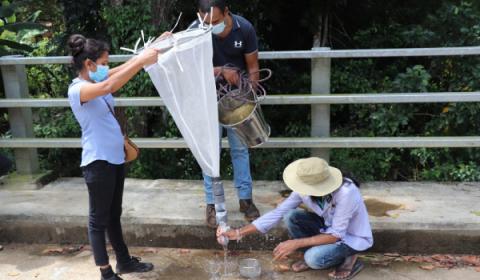Plastic Hotspot Identification and Solution (CounterMEASURE II)
Location: Maha Oya, Kelani River and West Coast of Sri Lanka
Duration: 6 months (October 2021 to March 2022)
Project Background:
Plastic is an essential component in our lives. However, the post-consumer plastic management has led to the pollution of lands, oceans and water, which in turn has led to known and unknown health challenges. Sri Lanka is identified as a leading contributor to ocean plastic pollution and was ranked among the top 20 countries by the mass of mismanaged plastic waste in 2010.
To balance the plastic use and to mitigate pollution, the Ministry of Environment released the National Action Plan for Plastic Waste Management - 2030 with short to medium-term strategies. The Ministry also launched a river basin programme titled “Surakimu Ganga” (Protection of Rivers) that goes beyond plastic pollution.
In this context, United Nations Environment Programme partnered with IUCN to support the Ministry of Environment to introduce the UN Environment Regional Initiative on River and Ocean Plastic named “CounterMEASURE II: Promotion of action against marine plastic litter in Asia and the Pacific.”
CounterMEASURE II will be implemented, initially in the Kelani River and Maha Oya Basins as a multi-stakeholder partnership. This project will benefit and collaborate with the ongoing work on plastic waste management, recycling and governance related policies and practices. To facilitate the implementation, the project will partner with Pirika Japan in micro plastic analysis in water; Asian Institute of Technology on mobile phone and vehicle mounted plastic waste remote sensing and identification; and Citizen Science applications based on mobile phones and direct interactions.
Objectives of the project
The overall objective of the project is to share and disseminate scientific knowledge and best practices on plastic pollution in Kelani River and Maha Oya at local, national, regional and global level to inform policy and the decision-making process.
The specific objectives of the project are,
- Conduct surveys of plastic pollution in support of the national effort including the “Surakimu Ganga” programme.
- Support the outreach of the “Surakimu Ganga” programme and findings of the report on plastic pollution in rivers in Sri Lanka.
- Implement piloting measures to reduce plastic pollution in rivers in Sri Lanka.
Expected Outputs
- Plastic hotspot identified to support waste management
- Plastics in the river locations trapped, for recycling and the sources identified
- “Microplastics” in selected stream locations and coastal waters analysed for future planning
- Awareness using “Citizen Science” to highlight consequences of plastic mismanagement
- Multi-stakeholder partnerships to enhance recycling and reduce overall plastic footprints
Donor/s: United Nations Environment Programme
Partner/s: Ministry of Environment, Universities, Private Sector including MAS Holdings

